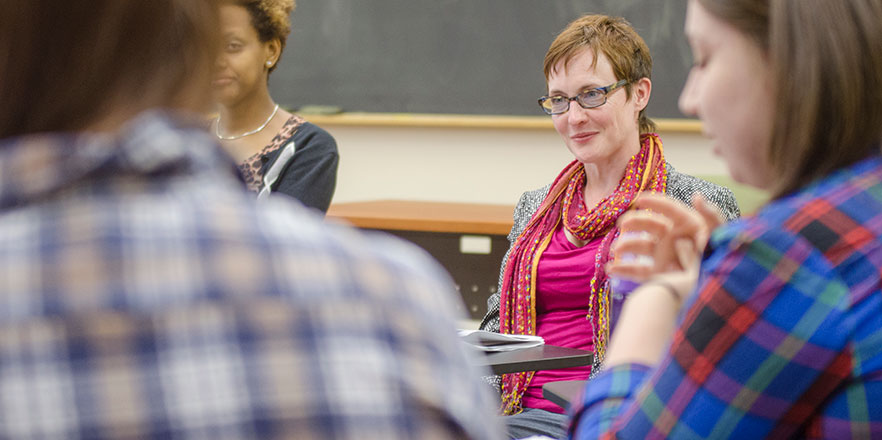First-Year Writing Program Recognized for Improving Student Success
By Savannah Tranchell

Whitman College is celebrating the success of its first-year writing assessment program, which has received the 2019 Beacon Award for Excellence in Student Achievement and Success from the Northwest Commission on Colleges and Universities.
The program was started two years ago, crafted by Charles E. and Margery B. Anderson Endowed Professor of Humanities Dana Burgess and Associate Professor of Rhetoric, Writing, and Public Discourse Lydia McDermott, who also serves as director of the college's Center for Writing and Speaking.
The assessment program was born out of a need that McDermott and Burgess saw to offer additional writing support for incoming students, particularly international students or those for whom English is a second language. They recognized that some of these students were struggling in the first-year Encounters course in what seemed a "sink-or-swim" model for success in academic writing.
"We both noticed through our work with students that sometimes they were not as well served as we would hope by enrollment only in Encounters, and that they needed additional support for developing written communication skills," said Burgess, who at the time served as director of the written and oral communication initiative.
Encounters is the college's first-year program, which introduces all Whitman students to college-level reading, researching and writing expectations. But not all faculty who teach the standardized course were trained in providing specialized writing instruction, McDermott said.
"The reality that we kept coming up against is that most faculty don't feel equipped to teach writing at a more basic level," McDermott said. "They feel equipped to grade writing and assign writing, but not to teach specific skills related to writing."
Burgess offered a winter writing workshop, but getting students to enroll was difficult. To address the disparity in writing abilities, Burgess proposed offering an assessment to all incoming students to see who could benefit from additional writing instruction, and expanding the college's offerings of its language and writing course.
The first group of students was assessed in September 2017. Each student had 20 minutes to respond to a writing prompt. The prompts were then graded anonymously by writing faculty, and those who scored in approximately the lower quarter of the assessment were enrolled in the writing course.
In the first year, 60 students took the course, and improved their score by an average of 4.5 points, compared to 1.6 points for those students who did not take the course.
In 2018, the difference was even greater: The 77 students enrolled in the writing course improved their score by 5.4 points on average, compared to 1.5 points for those who didn't take it.
"It's been more successful than we'd hoped," McDermott said, with instructors seeing the biggest gain in students' abilities to craft thesis-driven arguments supported by evidence. "That's the primary goal of the course, so I'm happy that's where people are improving the most."
The writing prompts are assessed on a five-point scale that examines the students writing on focus and thesis; support and development; structure and organization; awareness of audience and sense of voice; sentence clarity; and knowledge of conventions. McDermott carefully crafted the rubric so that students whose first language was not English would not be scored too harshly for grammar or spelling mistakes.
"Grammar and syntax are only one aspect in a five-point rubric. They could fail that completely and still not be placed in the course," McDermott said. "The majority of the assessment is: are you following the prompt, are you organized, are you creating a thesis statement and supporting it? Spelling and punctuation are really minor concerns."
The program was nominated for the Beacon Award by Associate Dean for Academic Affairs Kendra Golden.
"I think this program is successful because it is driven from the ground up by faculty and staff who are truly committed to helping students become better writers," Golden said. "Everyone involved participates because it improves the writing of under-prepared students and sets them up for success for the rest of their college career."
The program required significant investment from the college as well. In Fall 2016, before the writing assessment program began, Whitman offered only two sections of its language and writing course, serving about 30 students. This fall, there are 10 sections, with 150 seats total.
The results show that it was well worth the investment.
"The students have gotten stronger at writing, and the numbers are able to confirm that they've gotten stronger at writing because of enrollment in this course," Burgess said.
Next fall, the college will retire the Encounters program and roll out a new first-year curriculum, as well as revised distribution requirements for general education. An emphasis in writing abilities will remain a critical component, and the first-year writing assessment will continue to serve a role. The college is also offering professional development to faculty members who would like additional training in how to teach writing skills.
"I'm really glad that all students who need additional support to build their writing skills are able to get it," Burgess said.